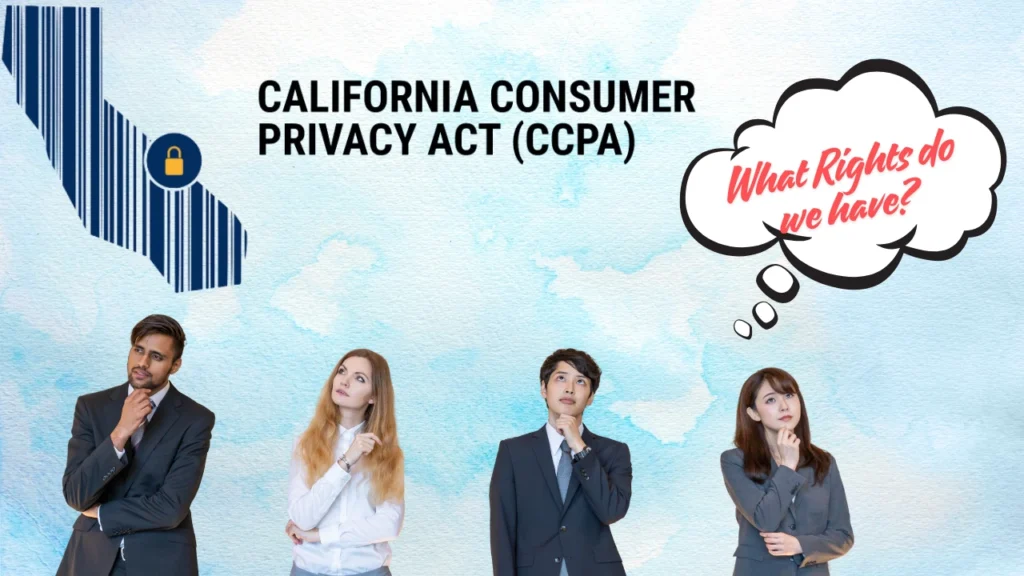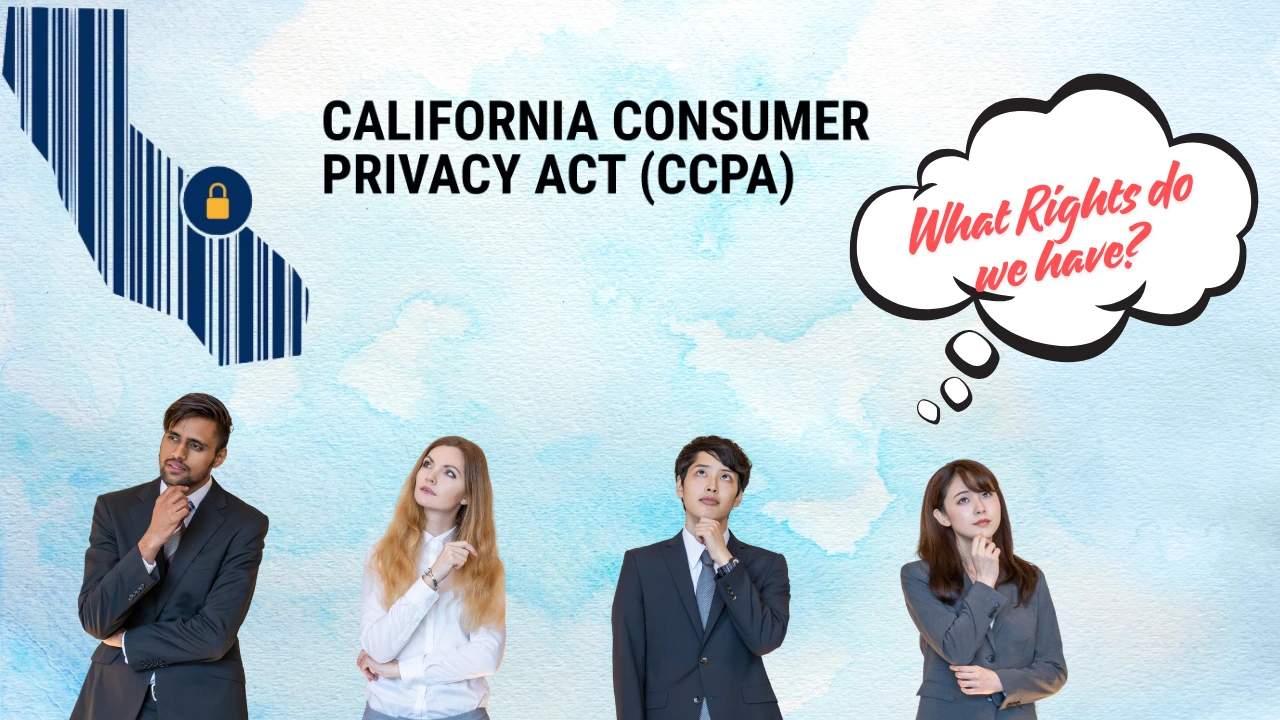Your Rights Under the California Consumer Privacy Act (CCPA).In today’s digital landscape, personal information travels faster than ever. Whether you are signing up for a newsletter, shopping online, or simply browsing a website, your data can be collected and stored.
Recognizing this, California created the California Consumer Privacy Act (CCPA), a groundbreaking privacy law that empowers residents with stronger control over their personal data. The given blog will provide information about the rights you hold under CCPA, present examples in simple terms, and highlight how you can exercise these rights in everyday digital life.
Your Rights Under the California Consumer Privacy Act (CCPA)-Overview
| Right | In Simple Words |
| Right to Know | See what data a business collects about you. |
| Right to Delete | Ask them to erase your data. |
| Right to Opt-Out | Stop them from selling your info. |
| Right to Non-Discrimination | No unfair treatment for using your rights. |
| Right to Correct | Fix wrong or outdated details. |
What Is the CCPA?
The California Consumer Privacy Act (2018) is basically a state-level law which was designed to protect the privacy of the residents of California as it provides more visibility to the consumers into how businesses gather, use, and share their personal information.
Unlike traditional privacy notices filled with legal jargon, the CCPA puts power back in the hands of the individual by granting clear rights to know, delete, and control the sale of data.

Why Does CCPA Matter?
For years, corporations have been quietly harvesting data such as names, browsing habits, shopping choices, even geolocation. That data often fuels targeted ads and cross-platform tracking. With CCPA, Californians gain transparency and authority, enabling them to demand accountability.
Who Does the CCPA Apply To?
The law doesn’t target small neighborhood shops; it’s focused on larger businesses.
| Requirement | Threshold |
| Annual gross revenue | Over $25 million |
| Data records handled annually | 50,000+ consumers, households, or devices (raised to 100,000 under CPRA) |
| Revenue from selling consumer data | 50% or more |
The Core Rights Under CCPA
Let’s explore the CCPA rights in more detail:
1. Right to Know
You have the right to request that a business disclose:
- The categories of personal data they collect.
- Sources of that data.
- Purposes for which it’s being used.
- Third parties with whom it’s shared.
2. Right to Delete
Consumers may instruct a business to erase their personal data, with some exceptions (like fraud detection or completing a transaction).
3. Right to Opt-Out
If a business sells your information (for advertising or analytics), you can demand they stop. This is why you often see the “Do Not Sell My Personal Information” link on websites.
4. Right to Non-Discrimination
A company can’t deny service, charge extra, or provide a different quality just because you exercised your CCPA rights.
5. Right to Correct (Added by CPRA 2023)
You can request businesses update or fix inaccurate information.
What Counts as “Personal Information” Under CCPA?
The law’s definition of personal data is broader than many expect. It is not just your name or email. The given table shows the types of data covered under CCPA:
| Category | Examples |
| Identifiers | Name, address, email, phone, SSN |
| Commercial Information | Purchase history, product interests |
| Internet Activity | Browsing history, search queries |
| Geolocation Data | GPS location, device tracking |
| Sensory Data | Audio, video, or call recordings |
| Professional/Employment Data | Work history, job applications |
| Inferences | Profiles created about you (e.g., preferences, characteristics) |
Exercising Your Rights
Using your CCPA rights is not complicated. Most businesses must provide at least two contact methods for consumers to make requests such as an online form, toll-free number, or email.
Steps to Exercise CCPA Rights are as given below:
- Submit a Request → Identify the right you’re invoking (e.g., request to delete data).
- Verify Your Identity → The business will confirm you are who you say you are.
- Wait for Response → Companies must respond within 45 days (extendable to 90).
- Receive Results → Information or confirmation of deletion provided.
Businesses’ Responsibilities
CCPA does not just create rights; it imposes duties on businesses:
- Provide a clear privacy policy.
- Include a visible “Do Not Sell My Personal Information” link.
- Train employees to handle privacy requests.
- Keep records of consumer requests.
CCPA vs. GDPR: A Quick Comparison
The CCPA is often compared to Europe’s GDPR (General Data Protection Regulation). Both aim to protect privacy, but they differ in scope.
| Aspect | CCPA (California) | GDPR (Europe) |
| Who it Protects | California residents | EU residents |
| Scope | Businesses meeting thresholds | All organizations processing data |
| Rights Granted | Know, Delete, Opt-Out, Non-Discrimination, Correct | Access, Rectify, Erase, Restrict, Portability, Object |
| Penalties | Up to $7,500 per violation | Up to €20 million or 4% of revenue |
| Data Sale Focus | Explicit opt-out from sale | No “sale” concept, broader processing rules |
Practical Example: Using CCPA in Real Life
Imagine you regularly shop online at a fashion retailer. You notice ads for shoes you looked at last week following you across multiple sites.
- Under Right to Know, you can ask the retailer to reveal which ad networks they shared your browsing data with.
- Under Right to Opt-Out, you can stop them from selling that information to those networks.
- If you leave the site permanently, you can use the Right to Delete to erase all your data.
Final Thoughts
The California Consumer Privacy Act is more than just legal jargon as it is a digital shield. It allows you to reclaim ownership of your data, demand clarity from companies, and prevent misuse. Even if you are not in California, similar privacy laws are emerging worldwide, making it clear: data privacy is no longer optional; it’s a fundamental right.
FAQs for Your Rights Under the California Consumer Privacy Act (CCPA)
Who can use CCPA rights?
Any resident of California, also if temporarily outside the state.
Does CCPA cover small businesses?
No, only businesses meeting size or data thresholds.
Can I ask twice?
Yes you can ask twice but businesses are only required to respond to two requests per year free of charge.
Does CCPA protect kids’ data?
Yes, stricter rules apply for children under 16, requiring opt-in consent for data sales.
